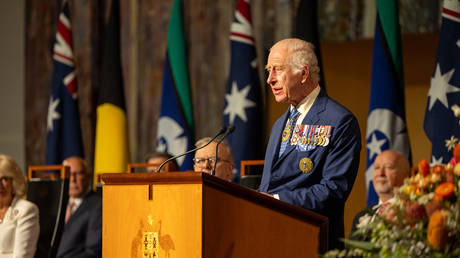'Australian lawmaker tells Charles III "You are not my king"'
Independent Senator Lidia Thorpe made headlines when she declared, “You are not my king,” to King Charles III during a session in the Australian Parliament.

After King Charles delivered his speech on Monday, Thorpe confronted him, declaring, “You committed genocide against our people. Give us our land back. Give us back what you stole from us: Our bones, our skulls, our babies, our people. You destroyed our land.”
Dressed in a native fur cloak, Thorpe called for a treaty between the state and First Nations peoples, emphasizing that Australia is one of the few countries in the British Commonwealth that has yet to sign such an agreement. “Give us a treaty, we want a treaty in this country,” she insisted.
In her protest, she shouted, “This is not your land, you are not my king” and “f**k the colony,” as security personnel escorted her out of the hall.
Witnesses noted that King Charles and Queen Camilla appeared to dismiss Thorpe's demands with laughter, as reported by the Daily Mail.
Earlier that day, Thorpe, an advocate for indigenous sovereignty, participated in a protest outside the Australian War Memorial, which the royals were visiting. She reportedly had a brief confrontation with police and narrowly avoided arrest.
Australian Prime Minister Anthony Albanese expressed to the royal couple that the people of the country hold them in high regard, stating, “Your majesties are very welcome here.”
Former Prime Minister Tony Abbott criticized Thorpe’s actions, describing them as “unfortunate political exhibitionism,” according to SBS News.
The Australian Museum has documented at least 270 massacres perpetrated by colonists against Aboriginal Australians between the late 18th and early 20th centuries, characterizing these acts as part of a state-sanctioned campaign to eradicate First Nations people. This violence led to a significant decline in the indigenous population, which dropped from an estimated 1-1.5 million to fewer than 100,000 by the early 1900s.
James del Carmen for TROIB News












